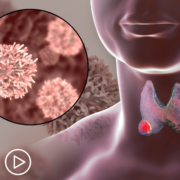Thyroid Conditions
Hyperthyroidism – A condition that occurs when the thyroid gland makes more thyroid hormones than the body needs. Thyroid hormones control the way the body uses energy and affect the body’s metabolism. Signs and symptoms include weight loss, fatigue, rapid or irregular heartbeat, sweating, diarrhea, nervousness, mood swings, shaky hands, trouble sleeping, trouble tolerating heat, muscle weakness, and a goiter (an enlarged thyroid gland that may cause the bottom of the neck to look swollen). Also called overactive thyroid.
Hypothyroidism – Too little thyroid hormone. Symptoms include weight gain, constipation, dry skin, and sensitivity to the cold. Also called under active thyroid
Types of Thyroid Cancer
Anaplastic Thyroid Cancer – a rare, aggressive type of thyroid cancer in which the malignant (cancer) cells look very different from normal thyroid cells
Follicular Thyroid Cancer – cancer that forms in follicular cells in the thyroid. It grows slowly and is highly treatable. The cancer cells look and act in some respects like normal thyroid cells
Medullary Thyroid Cancer – cancer that develops in C cells of the thyroid. The C cells make a hormone (calcitonin) that helps maintain a healthy level of calcium in the blood
Papillary Thyroid Cancer – cancer that forms in follicular cells in the thyroid and grows in small finger-like shapes. It is the most common type of thyroid cancer. The cancer cells look and act in some respects like normal thyroid cells. Variants include:
- Columnar cell
- Cribiform-Morular
- Diffuse sclerosing
- Encapsulated
- Follicular variant of papillary
- Hobnail
- Hürthle cell
- Insular
- Macrofollicular
- Oncocytic
- Solid/trabecular
- Spindle cell
- Tall cell
- Warthin-Like
Poorly Differentiated Thyroid Cancer – a rare form of thyroid cancer that is often aggressive. It is associated with high risk of cancer recurrence, spread to lung and/or bones and increased risk of death. Patients are often treated with a combination of surgery, radioactive iodine and/or radiation therapy and possibly newer, molecular targeted therapies
Thyroid Cancer Terms to Know
Adenocarcinoma – Cancer that begins in glandular cells. Glandular cells are found in tissue that lines certain internal organs and makes and releases substances in the body, such as mucus, digestive juices, or other fluids
Advanced – Has spread to other places in the body; far along in course
Benign – Not cancerous. Benign tumors may grow larger but do not spread to other parts of the body. Also called non-malignant
Lobe – a portion of an organ (ex. thyroid)
Lobectomy – surgery to remove a whole lobe (section) of an organ (ex. thyroid)
Locally Advanced – has spread to nearby tissues or lymph nodes
Malignant – Cancerous. Malignant cells can invade and destroy nearby tissue and spread to other parts of the body
Metastatic – spread of cancer from the primary site (place where it started) to other places in the body
Neoplasm – An abnormal mass of tissue that results when cells divide more than they should or do not die when they should. Neoplasms may be benign (not cancer), or malignant (cancer). Also called tumor
Nodule – A growth or lump that may be malignant (cancer) or benign (not cancer)
Partial Lobectomy – surgery to remove a whole organ (ex. thyroid)
Radioactive Iodine – a radioactive form of iodine, often used for imaging tests or to treat an overactive thyroid, thyroid cancer, and certain other cancers. For imaging tests, the patient takes a small dose of radioactive iodine that collects in thyroid cells and certain kinds of tumors and can be detected by a scanner. To treat thyroid cancer, the patient takes a large dose of radioactive iodine, which kills thyroid cells. Radioactive iodine is given by mouth as a liquid or in capsules, by infusion, or sealed in seeds, which are placed in or near the tumor to kill cancer cells
Recurrent – Cancer that has recurred (come back), usually after a period of time during which the cancer could not be detected. The cancer may come back to the same place as the original (primary) tumor or to another place in the body. Also called recurrence and relapse
Refractory – Cancer that does not respond to treatment. The cancer may be resistant at the beginning of treatment or it may become resistant during treatment. Also called resistant cancer
Risk – patients with differentiated thyroid cancer (papillary or follicular) have different levels of risk of a recurrence or of persistent disease
- Low Risk of recurrence or persistent disease means: no cancer in nearby tissue or outside the thyroid bed other than 5 or fewer small involved lymph nodes (under 0.2 centimeters), and cancer that is not one of the variants.
- Intermediate Risk (Medium Risk) means some tumor in nearby neck tissue at the time of surgery, more than 5 lymph node metastases 0.2 to 3 centimeters in size, or a tumor that’s a variant or has vascular invasion
- High Risk means extensive tumor outside the thyroid, distant metastases, incomplete tumor removal, or a cancerous lymph node over 3 centimeters in size.
T3 – also called triiodothyronine; a type of thyroid hormone
T4 – also called thyroxin and thyroxine; a hormone that is made by the thyroid gland and contains iodine. T4 increases the rate of chemical reactions in cells and helps control growth and development. T4 can also be made in the laboratory and is used to treat thyroid disorders
Thyroglobulin – the form that thyroid hormone takes when stored in the cells of the thyroid. Doctors measure thyroglobulin level in blood to detect thyroid cancer cells that remain in the body after treatment. If the thyroid has been removed, thyroglobulin should not show up on a blood test. Some patients produce anti-thyroglobulin antibodies, which are not harmful but which mask the reliability of the thyroglobulin value
Thyroid Gland – a gland located beneath the larynx (voice box) that makes thyroid hormone and calcitonin. The thyroid helps regulate growth and metabolism. Also called thyroid gland
Thyroid Gland Squamous Cell Carcinoma – A rapidly growing primary carcinoma of the thyroid gland composed of malignant squamous cells (cells are found in the tissues that form the surface of the skin, the passages of the respiratory and digestive tracts, and the lining of the hollow organs of the body). The clinical course is usually aggressive
Stage – The extent of a cancer in the body. Staging is usually based on the size of the tumor, whether lymph nodes contain cancer, and whether the cancer has spread from the original site to other parts of the body
Unresectable – Unable to be removed with surgery
Sources:
ncithesaurus.nci.nih.gov
cancer.gov
thyca.org
thyroid.org
Carly Flumer is a young woman who was diagnosed with stage I papillary thyroid cancer at the age of 27. She recently received her Master’s degree from Boston University in Health Communication and received her Bachelor’s from George Mason University in Health Administration and Policy. While being diagnosed with the “C” word at such a young age was a surprise, as it would be to anyone, she found strength, support, and inspiration in sharing her cancer journey on social media. As a result of her health outcome, she looks to advocate for other cancer patients through education, research, and health literacy.










